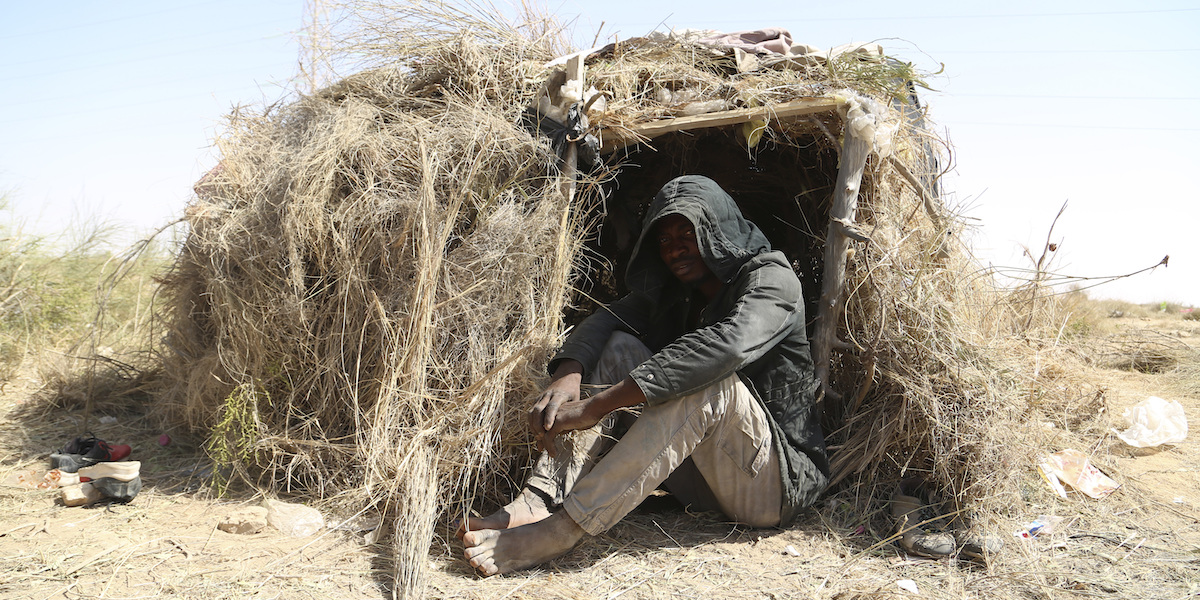Loading player
This week the Libyan Interior Ministry he said that at least five bodies of migrant people have been found in the desert on the border between Libya and Tunisia. It is not clear whether those bodies belonged to the group of 1,200 migrants from sub-Saharan Africa whom Tunisian security forces arrested in early July and forcibly moved to the desert in the east of the country, also on the border with Libya. Along with the discovery of the bodies, news of the rescue of hundreds of migrants abandoned in the desert and stories of survivors have also arrived in recent days.
Human rights organizations and journalists on the ground have spoken of repeated forced transfers of migrants in the desert carried out by Tunisian security forces, but there are no estimates or official data to detail these claims in more detail.
Nissim Gasteli, sent to Tunisia by The world, he said that since July 4, Tunisia has been conducting massive campaigns to arrest and forcibly transfer migrants from the city of Sfax to neighboring countries, abandoning them in the desert without water or food. Speaking about the discovery of the five bodies in the desert and the rescue of 140 sub-Saharan migrants, France24 writes that according to the NGO operators who reported the previous cases, the 140 rescued migrants “are only the last to have been taken to the Tunisian border with Libya or Algeria”.
The migration information site InfoMigrants also cites some human rights organizations active in the area, according to which the Tunisian government is carrying out a “purge” of the cities from “any” person of sub-Saharan origin, with “a wave of arrests followed by forced and illegal expulsions”.
There is no more information and it is difficult to know exactly what is happening in the desert between Tunisia and Libya, also because it is an area that is difficult to access for NGOs and journalists: there are few observers who have managed to speak with the surviving migrants, who described a extremely serious situation made of abuse and intense suffering. A lot has also been circulating in recent days photography taken by Libyan journalist Ahmad Khalifa: it shows the corpses of a woman and a child, probably mother and daughter, on the ground and in the sun near the border with Libya.
The migrants abandoned in early July said they were arrested during some operations carried out by the Tunisian security forces in Sfax, the coastal city in central Tunisia from which boats leave for Lampedusa. They said they were beaten, loaded onto some buses, taken to the desert and left in the sun, without water or food. One of them told of being beaten with iron bars, a woman of having lost the child she was pregnant with due to the beatings and the prolonged lack of water and food.
Some of these people lived and worked in Sfax: two of them, a barber and his wife, said they were arrested after going to hospital because of some attacks suffered and committed by Tunisian people. They spoke of “five buses with about 600-700 people on board” taken to the desert by the Tunisian authorities.
In some cases it seems that even regular migrants have been arrested and forcibly transferred to the desert. Some of the survivors heard from The world, who had regularly flown to Tunisia, said the Tunisian authorities destroyed their passports and documents and then took them to the desert. These testimonies seem to find confirmation in what was said by Hélène Legeay, who deals with the Middle East and North Africa for the World Organization against Torture (OMCT), an NGO that deals with human rights. Legeay told Le Monde that her organization had received photos of documents certifying the asylum-seeking status of many of the people transferred: they are people waiting to obtain refugee status, who cannot be deported until the procedure is completed .
Legeay believes that many forced displacements have been carried out only as racial discrimination, in violation of international reception standards, and with arbitrary arrests. Human Rights Watch, another non-governmental organization that deals with human rights, also spoke of «serious abuse» against «black African migrants and asylum seekers».
These stories and testimonies have assumed particular relevance because the European Union has just signed an agreement with the Tunisian government which provides for financial aid of around 1 billion euros to Tunisia to limit the departures of migrants. The agreement was signed by the president of the European Commission, Ursula von der Leyen, accompanied by the Italian prime minister, Giorgia Meloni, the Dutch prime minister, Mark Rutte, and Kais Saied, the authoritarian president of Tunisia.
The deal has been widely criticized by migration and reception experts, who believe it will cause enormous suffering and many deaths, as happened with the agreement reached with Libya in 2017, similar to this one. During his presidency, Saied has progressively transformed the country in an increasingly authoritarian direction and recently launched a very tough campaign against sub-Saharan migrants, trying to unload the country’s economic problems on them.
– Read also: What it means to “stop the departures” of migrants
President Saied defined «lies» the news relating to the abuses inflicted on sub-Saharan migrants, arguing that «the Tunisian security forces have protected those who have come to Tunisia and want to settle there, contrary to what is said». Meanwhile, on July 23, Saied was a guest at the International Conference on Development and Migration in Rome.
